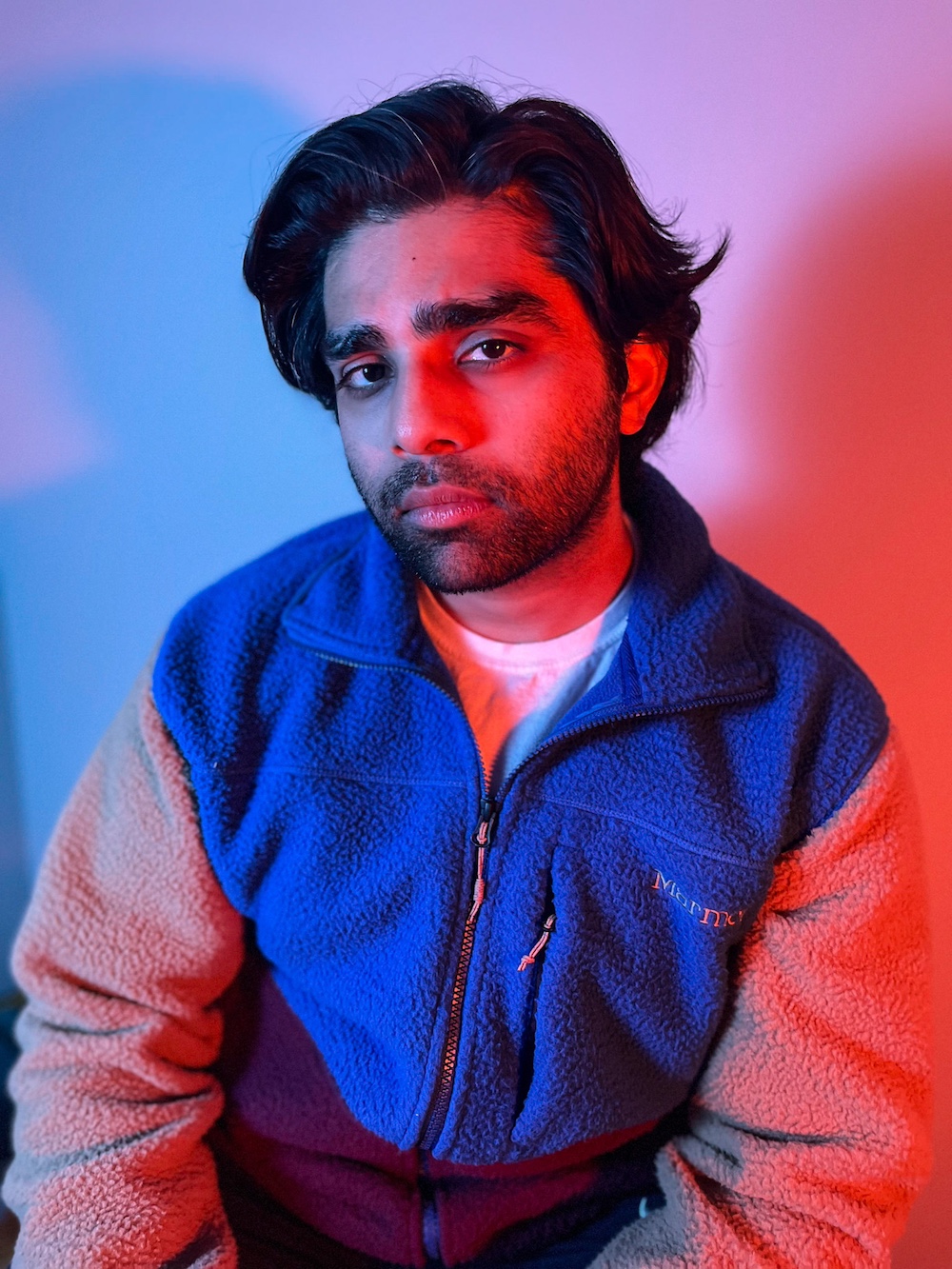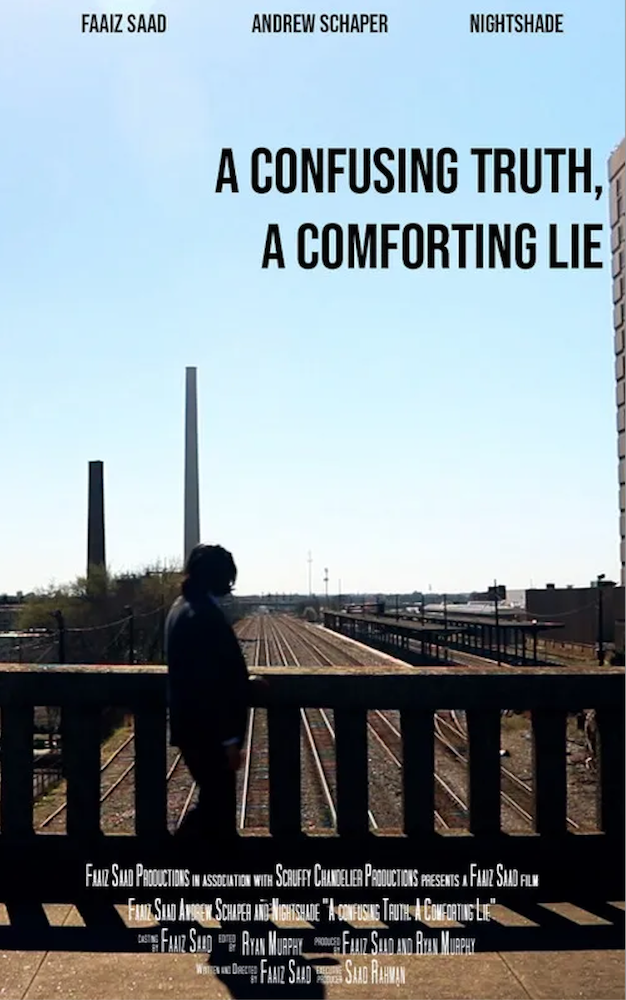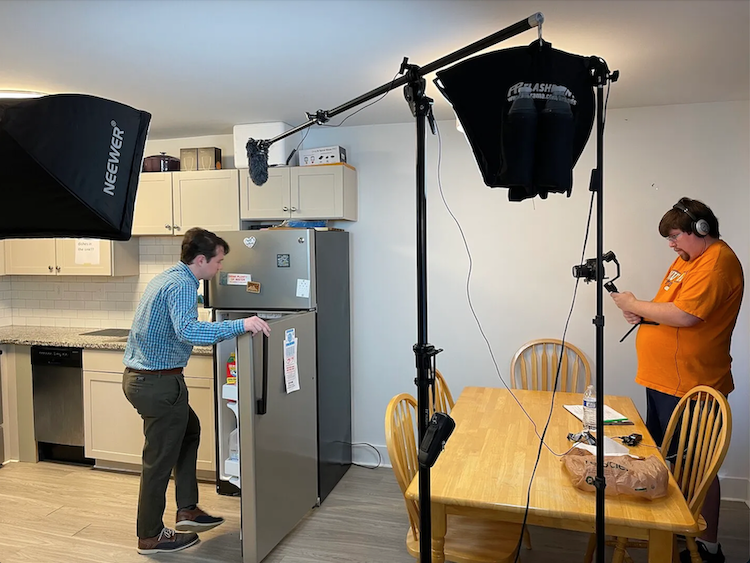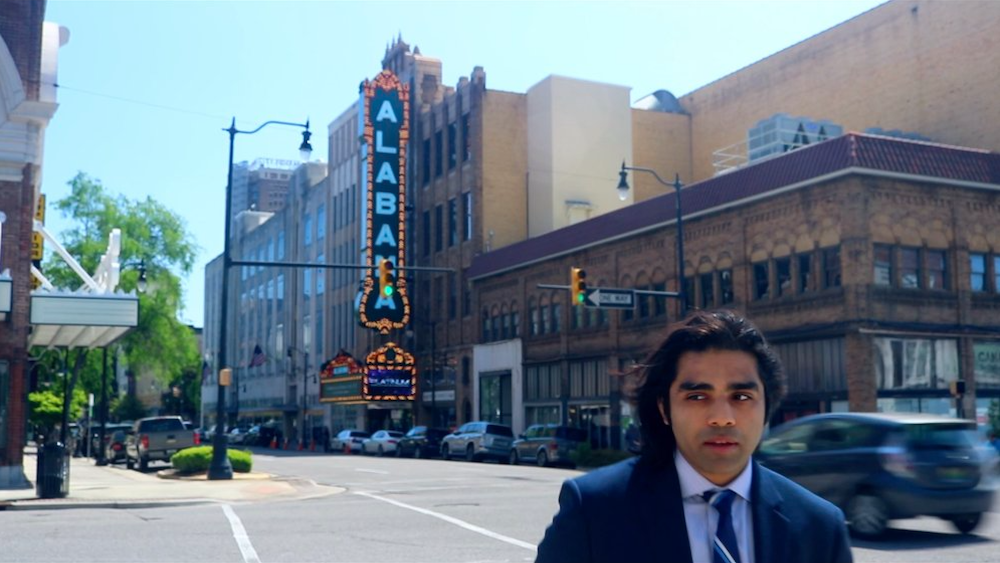Faaiz Saad, a fourth-year MD/MBA student at the Heersink School of Medicine and the Collat School of Business, recently wrote, produced, starred in, and directed a new short film entitled “A Confusing Truth, A Comforting Lie” that was nominated for the Gold Diamond Award for Best Student Short Film at the Asian Film Festival Los Angeles in December 2023. Faaiz Saad
Faaiz Saad
“In addition to being a physician, I am an artist, and I believe that to be the best, most balanced version of myself, I need to develop myself in all facets,” said Saad. “Medicine does a great job of fulfilling and developing me from an academic and left-brained standpoint, but filmmaking fulfills my creative and right-brained needs.”
“A Confusing Truth, A Comforting Lie” follows Kamran (the main character) after he is called to meet with HR, where he finds out that he has been framed for a crime following a workplace incident. He is given two options: help the company save face against racist allegations or risk imprisonment and the destruction of his career. The journey to make the decision forces Kamran to discover what he stands for, who he is, and how to answer the ever so complicated question for children of immigrants – where are you from?
“I wanted to highlight a few basic things that children of immigrants face in the U.S. but with a different take,” said Saad. “I want the audience to understand why seemingly small things like asking someone where they're from or mispronouncing their name may have more nuance than you would expect. I want to tell stories about people that look like me onscreen and share our stories with others.”
The Heersink School of Medicine communications team met with Saad to discuss his experience balancing medical school with filmmaking and what pursuing his passion means to him.
 The official film posterQ: What is your favorite part of the movie?
The official film posterQ: What is your favorite part of the movie?
Not to give away too much before it is publicly released, I'll tell you my second favorite part of the film. Near the end, the protagonist corrects someone when they try to shorten his name from Kamran to Kam. While a seemingly small thing, in the context of the film, it serves as an inflection point in the character's development. It also hits close to home with me and others with odd or difficult to pronounce names growing up in the U.S. As a kid, I would find myself in situations where I would be embarrassed because of my name. From having to correct teachers during roll call to using a fake name at Starbucks, it was something that I was reminded of constantly. Once I learned to embrace its uniqueness, it became a source of confidence and pride for me.
Q: What first drew you to filmmaking, and what inspires you to pursue that passion now as you complete medical school?
I’ve been interested in acting my entire life. I have been hooked since the first school play I acted in when I was five years old. I took a hiatus in college, and it wasn’t until I graduated and started my gap years that I reconnected with the craft and moved from acting in front of an audience to a camera. I reconnected with my good friend Ryan Murphy (also a Heersink grad), who wanted to collaborate with someone and direct a project. This partnership exposed me to the filmmaking process from preproduction through post. Even though I am an actor first and foremost, the exposure to other roles and responsibilities on movie sets made me more interested in filmmaking. With that partner, I made various projects ranging from PSAs and short films to a web series and feature-length film, all of which I starred in and produced.
Q: How long did writing, producing, and filming the movie take?
This particular film took me approximately three and a half years from coming up with the idea in my head to having the film's final cut ready for submission to festivals. I spent the first year and a half of medical school brainstorming ideas, writing drafts, and finalizing the script. The second half of my second year was spent preparing for filming, which we did at the end of my second year. During my third year of school, Ryan edited the film while balancing his workload as a pediatric intern. The film is now complete and ready for an audience, so I've been applying and going to different film festivals to promote the film during my last year of medical school.
Q: How do you balance filmmaking with your studies? Behind the scenes of filming
Behind the scenes of filming
Filmmaking and medicine is a balancing act. I know it doesn’t sound profound, but by breaking down a lofty goal into achievable, bite-sized objectives, it’s possible to progress toward the goal while giving my studies the attention they deserve. I think that, like with other things in life, you'll make it happen if you really care about it.
Q: What advice would you give other medical students with project ideas who are hesitant to explore them while in school?
Creative, artistic pursuits are as important for your well-being and development as your academic pursuits are for your career. The hardest part is getting started. Once you get over the initial inertia, every step snowballs and gives you the momentum to keep moving forward to new heights.
Q: What areas of interest/study are you pursuing in medical school?
I am currently applying to diagnostic radiology residencies. My research interests include the intersection of social media in medicine and the intersection of AI in medicine. I also produce patient and resident education videos, allowing me to combine my passion for film with my medical career.
Q: What draws you to the medical field?
My family has been in medicine for a while. My great-great-grandfather became the first physician in my family back in the 1860s. Growing up, my grandfather was a general practitioner who had an interest in diabetic patients. A film still from “A Confusing Truth, A Comforting Lie” When I went to Pakistan as a young child, I would sit in the clinic attached to my family home and watch my grandfather provide free medical care to indigent patients. My father is a nephrologist. When I was a little older, I would see patients with my father at his clinic. Seeing the tremendous impact they had on their patients throughout my childhood made me aspire to do the same.
A film still from “A Confusing Truth, A Comforting Lie” When I went to Pakistan as a young child, I would sit in the clinic attached to my family home and watch my grandfather provide free medical care to indigent patients. My father is a nephrologist. When I was a little older, I would see patients with my father at his clinic. Seeing the tremendous impact they had on their patients throughout my childhood made me aspire to do the same.
Q: What does the debuting of your film at a film festival mean to you?
My film premiering in LA represents growth to me. I started making films six years ago. In that relatively short time, I have put together a body of work that has screened at festivals across the country and impacted patient and resident education. During that same time, I also made great strides in my medical career, one pursuit complementing the other. One major difference between filmmaking and medicine is that in medicine, if I put in the work, there is a measurable, achievable success. In film, even if I do everything correctly, there’s no guarantee that audiences will like what I create. Additionally, with film, you have to let go of all control and trust others to help execute the vision you have in your head. Both represent different challenges in my life, and it is gratifying to see the progress I have made in both.
“A Confusing Truth, A Comforting Lie” has also been accepted to screen at the New Jersey Indian & International Film Festival.